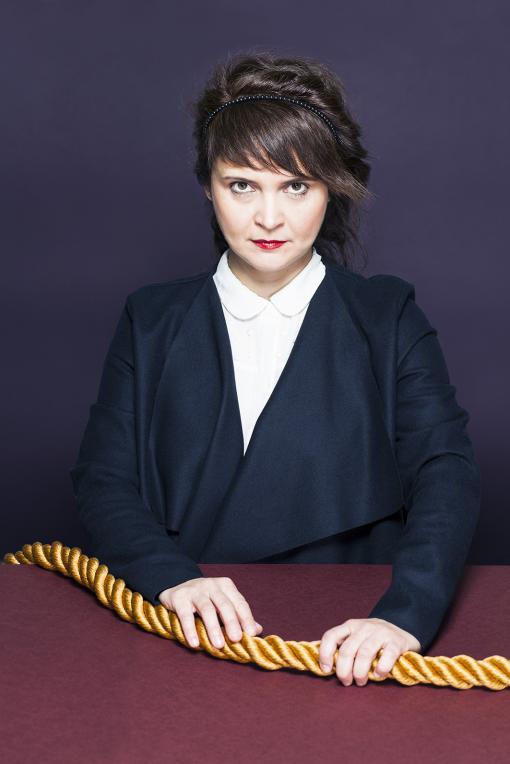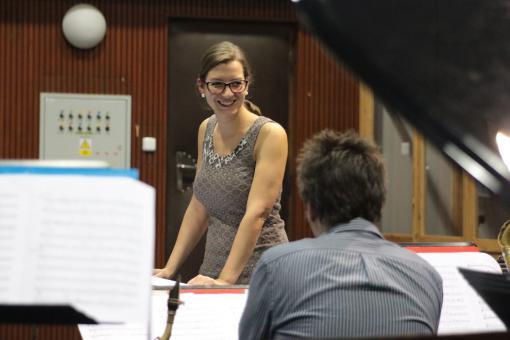When I polled Czech jazz musicians to find the most significant woman on the domestic scene, the largest number of votes went to the trumpet player, composer and conductor Štěpánka Balcarová and the pianist and composer Beata Hlavenková. In the JazzFest Brno festival both will be performing. The Concept Art Orchestra big band under Štěpánka Balcarová will be performing on Wednesday 5 April in the Theatre Husa na provázku and a day later the trumpet player will be playing in HaDivadlo with her Czech-Polish group Inner Spaces. On Thursday 13 April in Besední dům the will be a concert of Beata Hlavenková, focussing on her most recent album Scintilla. We conducted interviews with both young ladies.
Štěpánka Balcarová
Štěpánka, the Concept Art Orchestra was a big band which originally operated at the academy in Katovice, where you were a student. A few years ago you decided to revive it and transfer it to Prague. What was your aim in doing that? And has it been fulfilled?
To start with I had no great vision for the future. It was mainly at the time about one concert for Czech Radio in March 2014, where I wanted to play my own compositions and those of my friends, the so-called Prague Six. The further activities then developed from the winning of funds from cultural grants. But I must admit that the beginning was pretty tough for me.
Already in your ‘Katovice’ period you presented yourself as a composer of works for big band (for example the Song for Paolo). Has your approach to composition changed with your experience of orchestra conducting in recent years?
Yes, my approach has changed. I am now concentrating on making sure that the players perform the compositions well. Occasionally it is necessary to compromise between what it sounds like in your head and what it is in reality possible to play. If a work is too difficult the players will not perform it well, they won’t like it and in that case it will never sound good. And nobody wants that.
In 2015 the Concept Art Orchestra won the Anděl genre prize for the album The Prague Six, which presented works by six Czech composers from the younger generation, the Prague Six that was already mentioned. Since that time has the number of composers writing for the orchestra expanded?
In the spring of 2016 we held the first year of the Karel Krautgartner Composition Competition and in connection with that we played works by five new composers. With one of these, Jan Mazura, we have begun to work more closely. We are currently announcing the conditions for the second year of the composition. I hope we will find some more good composers.
Where will listeners be able to hear the successful compositions in the future?
The final evening, during which the new compositions will be played, will take place in Prague’s Studio A in Karlín at the end of November. So the best will come straight to the concert. Czech Radio will then broadcast the winning composition of the Vltava station within two weeks.
This year you are planning with Concept Art Orchestra a series of exceptional concerts in Prague’s Jazz Dock club. Specifically this includes for example Memories of Jan Zrzavý. Can you tell us something about this concert?
We have already given our first concert in this four-part series. The detailed programme for each of the evenings can be found on our website www.conceptartorchestra.cz. I would especially highlight the October concert, where we will join forces with the Austrian Graz Composer Orchestra. The concert will be conducted by Ed Partyka (founder and conductor of the original Katovice Concept Art Orchestra) and it will include works both by the Prague Six as well as several composers from Graz.
An interesting moment in the era of the earlier Concept Art Orchestra was the encounter with the German nuBox ensemble on the album Bigbandtronics. You are not interested in doing something similar now?
The idea of putting together an acoustic big band with electronic music appeals to Tomáš Sýkora. I’ll have to give him a call and see if he already has it written. (laughs)
What sort of programme are you preparing for JazzFestBrno, whre the orchestra will perform on April 5?
At this concert we will once more present the repertoire of the Prague Six. There will be three new works that listeners have yet to hear, and three pieces from our older repertoire.
A day later you will be playing in Brno with your Czech-Polish group Inner Spaces, with which you have just released a new album. How have you developed since the previous CD Light Year?
I don’t want my answer to influence the music critics who are still to write about our album. So far I have only read one review and I look forward to other ideas and impressions. I would only say that for now I am really happy with our band. I think that we have managed to establish a colourful repertoire with which musically we feel comfortable, relaxed and simply at home.
Last year with the orchestra you presented a tape of modified Christmas songs. Will this project have some kind of continuation? Will we hear the recordings?
I would like to carry on with it. I am trying with all my strength find further possibilities for carrying it out, because it is truly a unique project. So far we have agreed a December repeat as part of our Jazz Dock series. Currently I am also looking for sponsors who would like to participate in the recording of discs with this programme. At present the recording of our Prague concert is ‘hanging’, available for listening on the website of Czech Radio and there is also a link to it on our website.

Beata Hlavenková
Beata, in Brno at JazzFest you will be performing a concert programme Scintilla, taken from the album of the same name. While however you had a number of guests on it, live it will be mainly about your dialogue with the Norwegian pianist and one of the producers of the album, Anders Aarum. In what way do you feel that the encounter with him will be enriching. And will you still be able to surprise each other after further cooperation?
It is true that there another six guests on the album. I have begun to use a sampler, in which I recorded various excerpts of music by these guests, and I will play with this on the podium during the concert. With Anders it is just like with every other musician. After more concerts the interpretation is freer and more open and there is more space to give it free rein. At the last concert in Norway a young drummer and percussionist played with us, on the album Kenneth Ekornes plays percussion on the album and I am looking forward to Miloš Dvořáček, who will play with us in the Jazzfest concert.
While on the previous album Theodoros you played on acoustic piano, on Scintilla you also play on electronic keyboard instruments. Similarly Anders Aarum also plays on various keyboard instruments. What specifically will you play in the actual tour?
I wanted to get other keyboard instruments that I like and use on the recording. I recorded on the piano, Rhodes and then I worked with other synthesiser sounds or plugins, both at home and in the studio with Milan Cimf and Patrick Karpentski. Live I play on the piano, I use my voice and a sampler, Anders has a Rhodes, synthesisers and many special effects boxes with which he works various kinds of magic.
What changes are there in compositions from the album Scintilla compared to the studio versions? Do you also play compositions sung by guest singers on the CD?
We will be playing the composition Companion, sung on the album by Julia D. Aagard, instrumentally. I will be singing the rest myself.
You have already mentioned Miloš Dvořáček, who will be accompanying you. Why did you pick him in particular?
Miloš is for me simply unique, a phenomenal player, an elemental with whom we have found a common rhythmic language and simply said, it’s fun. Miloš has a lot of projects. We are now going to play a few concerts and then we’ll see …
So far you have mainly played Scintilla in Norway. What has the response been? And do you think that thanks to the participation of Anders Aarum that this project has something Scandinavian about it?
The Scintilla suite is a little different to what perhaps Anders played previously. It is a fusion which comes from minimalism and pop, there is not so much ‘open space’ and free improvisation – it is pre-composed. In that I saw definite differences, two perspectives, even though Anders also plays on plenty of ‘mainstream’ occasions. But we found our way and we enjoyed it. In Norway in March I played for instance for an older audience who were very attentive and loved it, but also for students around the age of twenty who were spending a year in a kind of transitional school working only with music. And they were also great. Possibly you can feel a greater openness there, a multicultural awareness and interest even though nobody knows me there. I experienced plenty of wonderful moments.
For the Infancy and Companion from the album Scintilla a little while ago animated videos were made. Did you give their creators specific instructions or di you give them a free hand? And why actually did you want these compositions to also have a visual form?
My music is pretty programmatic and the visual element seems to me an essential part of my ‘compositions’. The creators, students of the animated creation studio at Tomáš Baťa University, were to choose any work from the album and then could work with it as they liked. They only indicated how they hear or rather see it. I think the videos are pretty powerful.
You take part in the performance Flow by the VerTeDance dance ensemble. How is it different to compose music for dance performances in comparison with purely musical projects?
I had a given structure from Jirka Havelka and after writing and playing we rather dealt with details and slightly changed the ending, but essentially this performance is a linking off two artistic worlds. We don’t come together precisely, rather we sail alongside, feeding off the same energy, and even thought the length is fixed, each time it is slightly different. I really enjoy it.
You have also written songs for the children’s audiobook Pišlické příběhy. You are not planning some other further stage performance of this project? Or are you preparing something more for children?
We are going to play Pišlické příběhy in the original album line-up at Struny Dětem (Strings for Children) in Prague on May 20. We are not planning a new project by I would be happy to publish the score for Pišlické příběhy and occasionally it crosses my mind to write piano works for children.
What else are you working on now? I know that you also have a Czech-Slovak project with Marián Slávka and Lukáš Duchovič…
This trio with the title OOO was formed a year and a half ago. Now we are working on a recording, but the songs are happening along with others of our different activities. This year though we will also play concerts, and I’m looking forward to that. Aside from that I would like to publish the score to the album Theodoros, we are working on a new album with the group Baromantika and on top of that I am preparing a solo piano album. This time it will be my versions of carols from various parts of the world.































